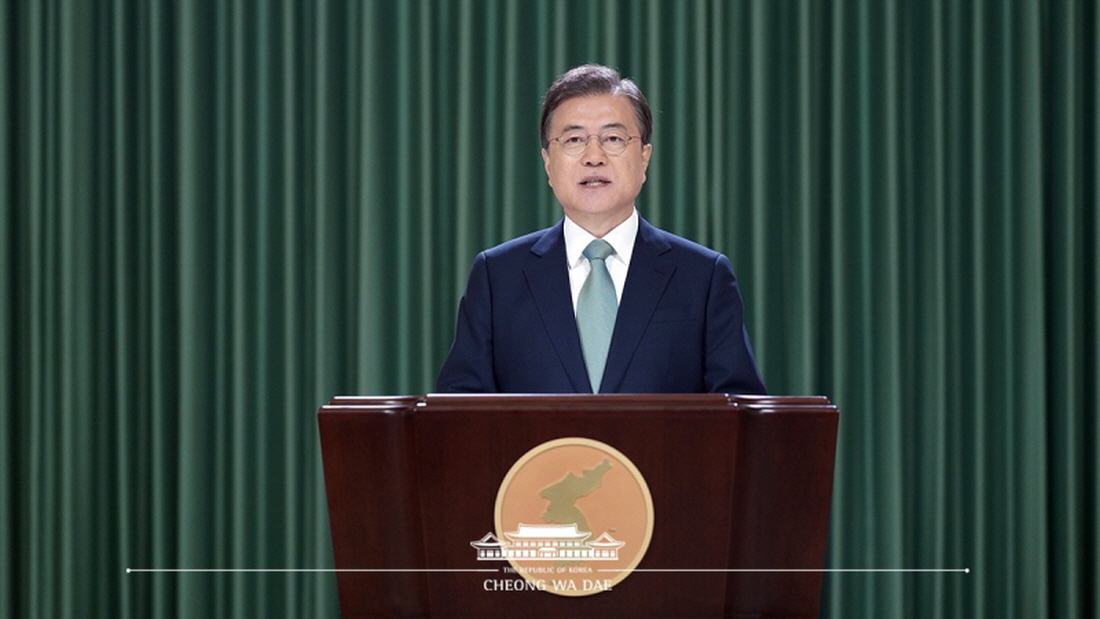이 웹사이트는 제19대 대통령 임기 종료에 따라 대통령기록관이 「대통령기록물 관리에 관한 법률」에 의해 이관받아 서비스하는 대통령기록물입니다. 자료의 열람만 가능하며 수정 · 추가 · 삭제는 불가능합니다.
다만, 「개인정보보호법」에 의하여 개인의 정보를 보호받기 원하시는 분은 관련 내용(요청자, 요청내용, 연락처, 글위치)을 대통령 웹기록물 담당자(044-211-2253)에게 요청해 주시면 신속히 검토하여 조치해 드리겠습니다. 감사합니다.
SPEECHES & REMARKS
BRIEFINGS
Congratulatory Message from President Moon Jae-in on 20th Anniversary of June 15 South-North Joint Declaration

Fellow Koreans, distinguished guests from home and abroad,
As we mark the 20th anniversary of the June 15 South-North Joint Declaration, I am grateful to everyone joining this meaningful event.
At today’s joyful celebration of this historic declaration, I should be revisiting the great achievements of that declaration and reporting on how far we have progressed toward a peaceful Korean Peninsula. However, I feel frustration and regret for not being able to do so due to current circumstances.
Recently, North Korea criticized organizations run by North Korean defectors for sending anti-North leaflets across the border and condemned our Government, cutting off communication channels. For this reason, the public is worried about the possibility of reverting to inter-Korean confrontation. We’ve always been using cautious approaches to take just one step forward – as if walking on ice – but now it seems that was insufficient.
As our current situation is complicated, I have come to think again about the courage and wisdom of President Kim Dae-jung, who finally managed to arrange an inter-Korean summit by weathering countless setbacks and severe ideological assaults. On June 15, 2000, the leaders of South and North Korea sat down together for the first time in 50 years since the outbreak of the Korean War. They could do so because they believed in the power of dialogue.
The June 15 South-North Joint Declaration made it possible to reconnect severed railroads and roads and start Geumgangsan Mountain tourism and the Gaeseong Industrial Complex. Sixty-thousand families separated by the division of Korea were able to confirm whether or not relatives on the other side were alive, and 24,000 of them were able to have a reunion.
A total of 125 South Korean businesses moved into the Gaeseong Industrial Complex and started joint economic projects by hiring 55,000 North Korean workers. Two million South Koreans have traveled Geumgangsan. All of this is the outcome of dialogue.
In 2017 when clouds of war were darkening the Korean Peninsula, the leaders of the two Koreas were able to sit face to face again because both were determined to continue to uphold the spirit of the June 15 South-North Joint Declaration. The power of dialogue made it possible to complete the PyeongChang 2018 Olympic Winter Games as a successful “Peace Olympics” as well as begin the first-ever North Korea-U.S. summit.
The Korean Peninsula is not yet in a situation where both Koreas can charge ahead as much we desire at our own discretion. We must move forward, though slowly, with the international community’s consent.
Unquestionably, however, there are projects that both Koreas can pursue independently. What matters the most is the trust between us. The South and North have to build up mutual trust through unceasing dialogue.
Fellow Koreans, distinguished guests,
The unpleasant and difficult problems facing the two Koreas can only be resolved through communication and cooperation. We should not let enmity and misunderstanding stand in the way of our efforts for peace and coexistence.
I am well aware of how much Chairman Kim Jong Un has worked to significantly change the situation on the Korean Peninsula. I also deeply regret that relations not only between the two Koreas but also between North Korea and the United States have not advanced as much as we had expected.
However, the promise of peace on the Korean Peninsula that I and Chairman Kim Jong Un made before 80 million Koreans cannot be reversed. My Administration will not abandon efforts to maintain communication. We will work continuously to implement the April 27 Panmunjom Declaration for Peace, Prosperity and Unification of the Korean Peninsula and the September 19 Pyongyang Joint Declaration of 2018. In the Panmunjom Declaration, the two Koreas agreed to cease all hostile acts, including the scattering of leaflets in the areas along the Military Demarcation Line (MDL). The July 4 Joint Communiqué, the Agreement on Reconciliation, Non-aggression and Exchanges and Cooperation and other previous inter-Korean accords have repeatedly clarified the same intent many times. These are agreements that anyone who longs for peace and prosperity on the Korean Peninsula should abide by. I ask the people to join forces so that these agreements can be observed. I also ask North Korea not to close the window on talks. I hope that even when facing obstacles, dialogue will enable us to put our heads together and leap over them.
The June 15 South-North Joint Declaration was a warm breeze that touched the Korean people’s hearts and a historic announcement that changed the destiny of the Peninsula. We could finally sense that reconciliation among the people and peace on the Peninsula were not just distant dreams.
Peace equals the economy, jobs and our lives. Peace does not come overnight. The more difficult it is, the more we have to start with small, achievable tasks. No one else will bring us peace. We have to forge our destiny ourselves. It is something that South and North Korea must do together.
I remember President Kim Dae-jung’s remark, “In the coming 21st century, let us Koreans join hands and soar upward without fail to become an advanced nation through co-existence and co-prosperity.” We will usher in an era, without fail, when South and North Korea band together and cooperate for peace and prosperity.
Thank you.



